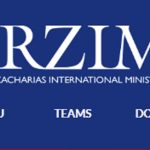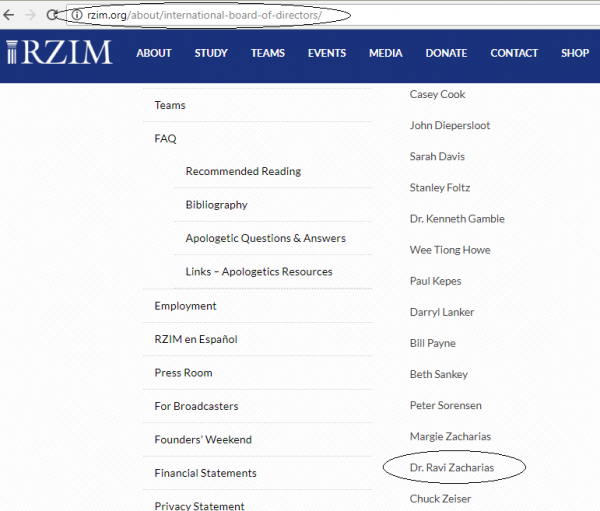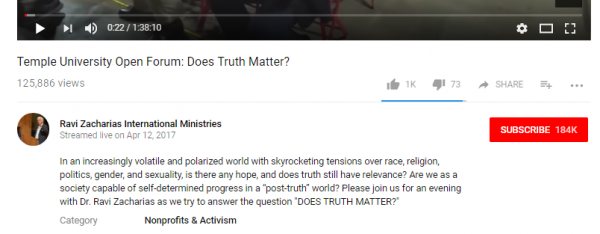As follow up to the story about the use of the title “Dr.” by Ravi Zacharias and his ministry, I examined the policies of over a dozen colleges and universities both here and abroad.
The most recent statement from Ravi Zacharias claims the following:
In earlier years, “Dr.” did appear before Ravi’s name in some of our materials, including on our website, which is an appropriate and acceptable practice with honorary doctorates. However, because this practice can be contentious in certain circles, we no longer use it.
Zacharias’ ministry claims it is an “appropriate and acceptable practice” to use the title “Dr.” with honorary degrees. I would like to know where that is the case. My research tells a different story.
I found that an honorary doctorate does not grant the privilege of using Dr. as a prefix at most schools. I only found one school which expressly allows (well two if you count an unaccredited school where you can buy a degree). Some schools don’t have policies online, whereas most I consulted advise against it. Below are the policies I found.* I start with the UK schools since this is the world where Ravi Zacharias claims to have gotten some honors.
15. Honorary graduates may use the approved post-nominal letters as contained in section A1.1.8 of the University Regulations: ‘Honorary Degrees’. It is not customary, however, for recipients of an honorary doctorate to adopt the prefix ‘Dr’.
If you click through to Section A1.1.8, you see the titles which are supposed to be used by degree recipients after their names (e.g., HonDLitt, for a Doctor of Letters). This alerts the public to the fact that the degree is honorary.
Honorary graduates shall be advised that recipients of an honorary degree may use the approved designatory letters after their names; Hon DArts, Hon DEng, Hon LLD Hon DLitt, Hon DSc, Hon DTech. It is not customary, however, for recipients of an honorary doctorate to use the title ‘Dr’ in front of their name.
Robert Gordon University Aberdeen
Recipients of an honorary degree may use the approved post-nominal letters [e.g., HonDArts]. It is not customary, however for recipients of an honorary doctorate to adopt the prefix ‘Dr’.
In the U.S., university policies vary in wording but consistently indicate honorary degree recipients should not represent themselves as holding an earned degree.
While a significant and important award, an honorary doctorate does not have the same standing as an earned doctorate and should not be represented as such.
From here on, the policies leave no room for doubt about the matter.
In no instance will the recipient of an honorary doctorate from Florida Atlantic University represent the award as being an earned doctorate or an earned academic credential of any kind. This award does not entitle the recipient to use the title of “Dr.” or append “Ph.D.” or any other earned degree designation after his/her name. Inappropriate use of the award could result in its withdrawal by action of the President and Provost, with the input of the University Faculty Senate Honors and Awards Committee.
…always indicate degree was honorary, ie “an honorary doctorate of humanities”; do not refer to person as Dr. if he/she has only an honorary degree.
A recipient of an honorary degree should never be referred to as doctor (if this is the only degree held). In running text: • Drew Becher holds an honorary doctorate of humane letters. Abbreviations of Honorary Degrees • Honorary Doctor of Arts – D.A. (h.c.) • Honorary Doctor of Arts and Human Letters – D.A.H. (h.c.) • Honorary Doctor of Business – D.B. (h.c.) • Honorary Doctor of Fine Arts – D.F.A. (h.c.) • Honorary Doctor of Humane Letters – D.H.L (h.c.) • Honorary Doctor of Liberal Arts – D.L.A. (h.c.) [h.c. abbreviates the Latin honoris causa – “for the cause of honor”]
Do not refer to an honorary degree holder with the courtesy title Dr. or Hon. When referring to someone who holds an honorary degree, make clear that the degree is honorary.
Recipients of an honorary doctorate do not normally adopt the title of “doctor.” In many countries, including the United Kingdom, Australia, New Zealand and the United States, it is not usual for an honorary doctor to use the formal title of “doctor,” regardless of the background circumstances for the award.
A person with an honorary doctorate is not called Dr.
honorary degrees All references to an honorary degree should specify that the degree was honorary. Robert Shangraw ’58, H’04. Do not use Dr. before the name of an individual whose only doctorate is honorary. an honorary doctor of laws degree (emphasis in the original)
For those who receive honorary degrees, the letter “H” is used after the individual’s name with the date the degree was conferred. Do not refer to someone as “Dr.” if he or she has only an honorary doctorate.
“Dr.” before a name is acceptable in internal communications to indicate either an academic doctoral degree or a physician’s credential. For external use, use Ph.D., M.D., or similar abbreviation after the name. • do not use the redundant Dr. John Smith, M.D., or Dr. Steve Smith, Ph.D. • do not use “Dr.” for honorary degrees.
To designate using the honorary degree • Wil Haygood, LHD (h.c.) The (h.c.) is Latin for “honoris causa.” A recipient of an honorary degree should never be referred to as doctor (if this is the only degree held)
Honorary degree recipients are properly addressed as “doctor” in correspondence from the university that awarded the honorary degree and in conversation on that campus. But honorary degree recipients should not refer to themselves as “doctor”, nor should they use the title on business cards or in correspondence. However, the recipient is entitled to use the appropriate honorary abbreviation behind his or her name, for example, [full name], Litt.D. On a resume or in a biographical sketch, they may indicate an honorary degree by writing out the degree followed by the words “honoris causa” to signify that the degree is honorary, not earned.
When addressing a person who has received an honorary degree from another university, it is not correct to use the term “doctor” nor should the title be used in correspondence, biographical sketches, introductions, or on place cards.
One school — Lynchburg College in Virginia — allows honorary degree recipients to use the title Dr., but that is the only one I could find among accredited schools during my search.* One other, the Los Angeles Development Church and Institute proudly proclaims that you can make a donation and get an honorary doctorate. Then it is just fine to call yourself doctor.
Although I suspect Ravi Zacharias fans will continue to believe he has been entitled to his title and perhaps still is, this survey of policies should make it clear to an objective observer that the trend is against using the title Dr. with the honorary doctorate alone.
*I stopped after a searching through about two dozen schools when it became apparent that the trend was that an honorary doctorate recipient should not use the title “Dr.” If someone can show me schools I missed with different policies, I will gladly add them to this post.




